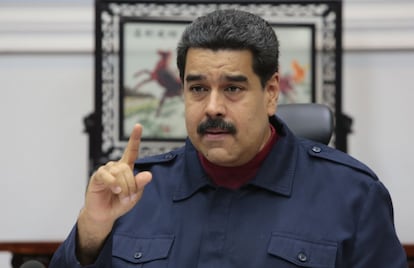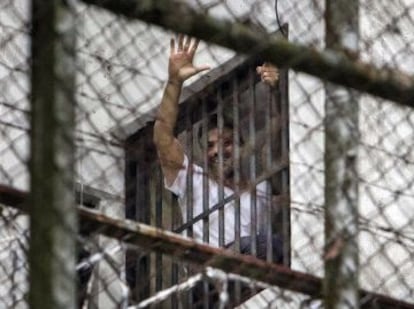Venezuelan Assembly passes amnesty law to free political prisoners
President Maduro vows to veto a bill that would benefit jailed opposition leader Leopoldo López

The Venezuelan opposition has caught President Nicolás Maduro’s chavismo government off guard. The legislative agenda of the National Assembly was unexpectedly modified on Tuesday to incorporate the debate and approval of the Amnesty and Reconciliation Law, which will benefit 78 political prisoners.
After a seven-hour debate, the proposal by the Democratic Unity Roundtable (MUD) got the green light.
The opposition-controlled Congress was going to discuss the bill on Thursday, but Deputy Delsa Solórzano moved to include it in the Tuesday agenda.
Representatives of the ruling United Socialist Party of Venezuela called the law “outlandish” and refused to vote in favor.
The ruling United Socialist Party describes the political prisoners as “murderers”
“To grant amnesty is to forget without providing reparation for the victims,” said party representative Pedro Carreño.
The release of political prisoners increases existing tensions in the country. The reputation of the Venezuelan government is under scrutiny as a result of its imprisonment of politicians, particularly in the wake of the protests against President Maduro in February and March 2014.
Opposition leaders Leopoldo López, Daniel Ceballos, Manuel Rosales and Antonio Ledezma were arrested for inciting hatred and conspiring against the government.
López is one of the biggest stones in the shoe of chavismo, which follows the leftist, popular doctrine of late Venezuelan leader Hugo Chávez.

López, a former mayor of the Caracas municipality of Chacao and leader of the Political Will party, encouraged a government “exit” two years ago through street marches.
There were 43 deaths across the country as a result of these protests, nearly all caused by gunshot wounds. The government went after López, who eventually turned himself in and was jailed one week after the start of the anti-Maduro demonstrations.
His imprisonment was harshly criticized by human rights activists. In September of last year, López was sentenced to 13 years and nine months in prison, a conviction that international observers such as the United Nations and Human Rights Watch considered a cause for concern over the state of democracy in Venezuela.
Yet López’s leadership has grown since then, while Maduro’s popularity has been dropping fast as a result of the country’s economic and political crisis. This erosion of chavismo’s hegemony is being felt in the polls: 19% of the population would choose López as the next president of Venezuela over Maduro and over the governor of Miranda, Henrique Capriles Radonski, according to a survey released this month by polling firm Hinterlaces.
Sign up to our newsletter!
The EL PAÍS English Edition is launching a weekly newsletter. Sign up today to receive a selection of our best stories in your inbox every Saturday morning. For full details about how to subscribe, click here.
The passing of the amnesty law will increase the power struggle between the Assembly and the Supreme Court. National Assembly speaker Henry Ramos Allup warned that the Supreme Court was “cooking up” a ruling to declare the amnesty law unconstitutional.
Meanwhile, the government is refusing to free jailed opponents. While the bill was still being debated on the floor of the Assembly, President Maduro stated that “you can be sure this law will not pass through here [the executive].”
The Amnesty Law, which is made up of 29 articles, must be reviewed by the head of state before going into force. Maduro now has two options under the Venezuelan Constitution: he can suggest changes that will send it back to the Assembly for further debate, or he can forward the document straight to the Supreme Court for evaluation.
The ruling United Socialist Party, which describes the political prisoners as “murderers,” has launched campaigns against an amnesty law that, it says, will create impunity.
But opposition deputies note that individuals accused of homicide, of inflicting serious injuries or of crimes against humanity are not being included in the amnesty.
English version by Susana Urra.
Tu suscripción se está usando en otro dispositivo
¿Quieres añadir otro usuario a tu suscripción?
Si continúas leyendo en este dispositivo, no se podrá leer en el otro.
FlechaTu suscripción se está usando en otro dispositivo y solo puedes acceder a EL PAÍS desde un dispositivo a la vez.
Si quieres compartir tu cuenta, cambia tu suscripción a la modalidad Premium, así podrás añadir otro usuario. Cada uno accederá con su propia cuenta de email, lo que os permitirá personalizar vuestra experiencia en EL PAÍS.
¿Tienes una suscripción de empresa? Accede aquí para contratar más cuentas.
En el caso de no saber quién está usando tu cuenta, te recomendamos cambiar tu contraseña aquí.
Si decides continuar compartiendo tu cuenta, este mensaje se mostrará en tu dispositivo y en el de la otra persona que está usando tu cuenta de forma indefinida, afectando a tu experiencia de lectura. Puedes consultar aquí los términos y condiciones de la suscripción digital.









































